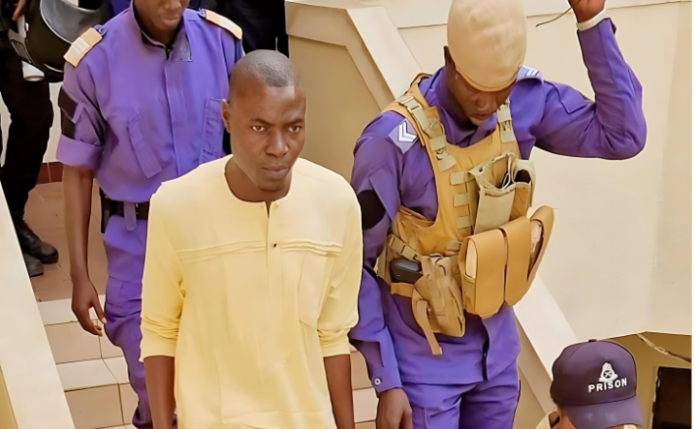By Kemeseng Sanneh (Kexx)
The murder and terrorism trial of Ousainou Bojang took a significant turn Monday as a defence witness testified that Bojang was with him on the night two Gambian police officers were shot dead — directly challenging the prosecution’s version of events and raising questions about the strength of their case.
Ousainou Bojang, who stands accused of fatally shooting two police officers and seriously injuring a third at the Sukuta traffic lights on the night of September 12, 2023, has denied all charges. The prosecution alleges Bojang carried out the attack alone and then fled the country, with his sister, Amie Bojang, helping him after the incident. She is charged as an accessory after the fact.
But in a courtroom packed with observers, Sulayman Faal, appearing as the second defence witness (DW2), told the court he was with Ousainou Bojang at the time the shooting occurred. Faal testified that he had been residing at a lodge in Brufut, where Bojang worked as a security guard. He said Bojang not only provided him and his partner — described in court as his “white lady” — with accommodations but also took care of their day-to-day needs during their three-month stay.
According to Faal, on the evening of September 12th at around 11 p.m., Bojang came to his room at the lodge with news he had seen online about a shooting involving police officers. “He told me about it after seeing it on What’s On Gambia,” Faal said. “He told me not to go out that night, to be careful.”
Faal added that Bojang remained within the lodge compound the entire night. “I saw him more than once that night. He was there. He didn’t go out,” he said, suggesting that it would have been impossible for Bojang to be at the crime scene in Sukuta at the time the shooting occurred.
The witness’s account was further detailed under questioning by defence counsel Lamin J. Darboe. Faal confirmed that Bojang’s duties at the lodge required him to stay on-site, and that it was common for him to deliver food, take care of logistics, and interact with guests. He said Bojang frequently kept to his room unless called upon and did not appear to have left the lodge that evening.
However, during cross-examination, Director of Public Prosecutions A.M. Yusuf questioned Faal’s memory and credibility. When asked if he remembered the exact date he checked into the lodge, Faal admitted he did not, but said he had been living there for three months and was certain Bojang was there on the night of the shooting. He acknowledged that Bojang was a friend but rejected the suggestion that he was testifying out of loyalty. “I wouldn’t defend him if he did wrong,” Faal insisted. “I would have told him to apologise if he was guilty.”
The prosecution pressed further, suggesting Faal might be biased or unaware of Bojang’s movements in the early hours. Faal maintained that Bojang did not leave the premises and was present at the lodge the following morning, when they exchanged greetings. Asked if Bojang mentioned any travel plans to Senegal — where authorities later claimed he was headed — Faal said no such plans were discussed.
In response to a question from the bench, Faal also disclosed that he had never been contacted by the police during the investigation and had not given any statement until now.
Following Faal’s testimony, the defence called a third witness, Famara Bojang — a cousin of both Ousainou and Amie Bojang. Famara recounted a phone call he received from Ousainou on the same night of the alleged shooting. According to Famara, Ousainou called to apologise for previously accusing him of interfering with his relationship with a foreign woman. Bojang allegedly explained that his accounts had been hacked, which had caused confusion, and he shared pictures of the suspected hacker.
Famara testified that later that evening, Ousainou met him in person to further apologise and told him he planned to apologise to their stepfather as well, saying he had distanced himself from the family because of the fallout with the woman.
During his testimony, Famara also claimed that Bojang never mentioned any shooting, nor did he seem distressed or in a hurry — further suggesting that he was unaware or uninvolved in any crime that evening.
The court adjourned the session before cross-examination of Famara could proceed. The matter was rescheduled for continuation on May 27.
















